Teacher as Enquirer Assignment PDF
VerifiedAdded on 2021/05/31
|13
|3046
|115
AI Summary
Contribute Materials
Your contribution can guide someone’s learning journey. Share your
documents today.
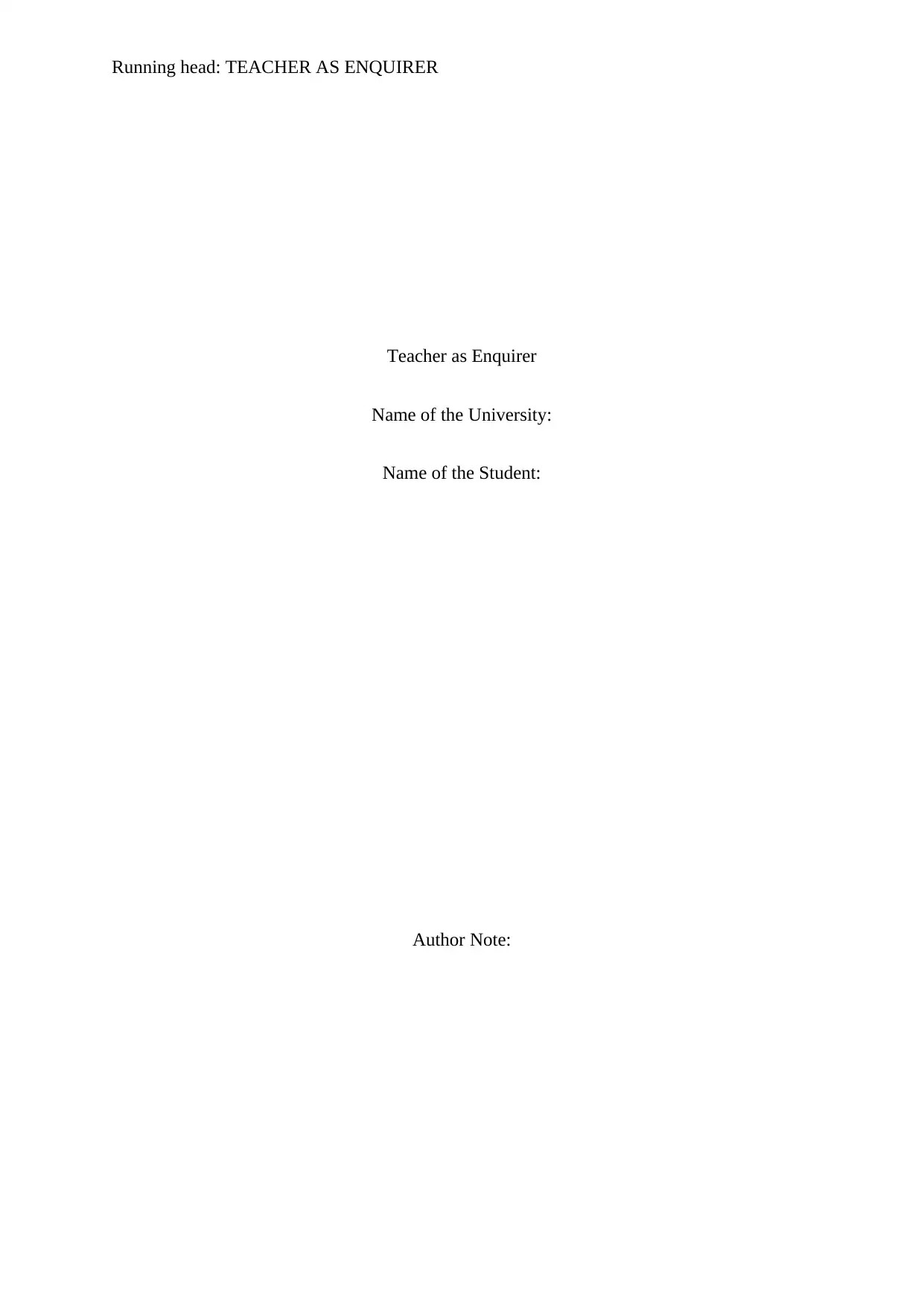
Running head: TEACHER AS ENQUIRER
Teacher as Enquirer
Name of the University:
Name of the Student:
Author Note:
Teacher as Enquirer
Name of the University:
Name of the Student:
Author Note:
Secure Best Marks with AI Grader
Need help grading? Try our AI Grader for instant feedback on your assignments.
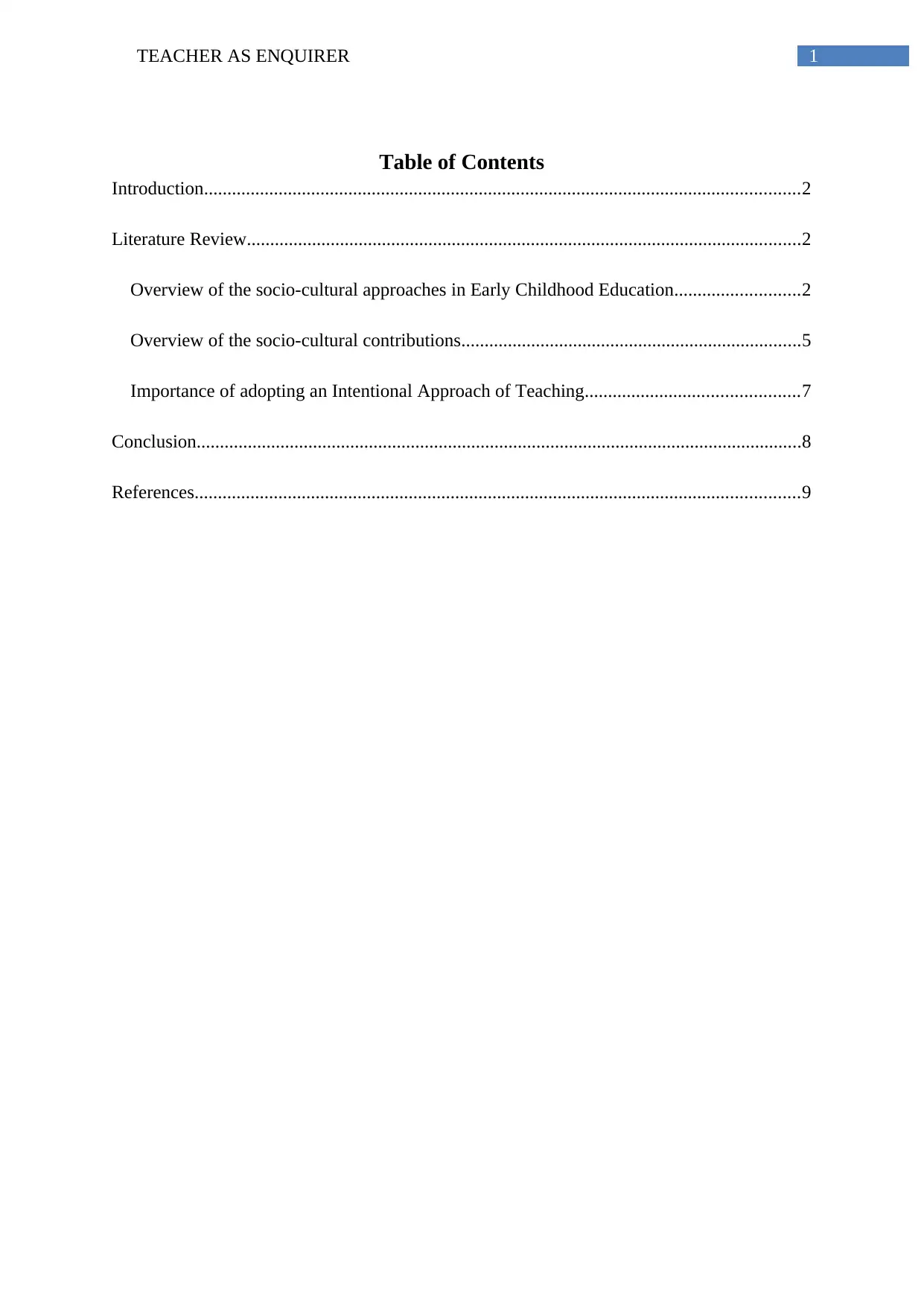
1TEACHER AS ENQUIRER
Table of Contents
Introduction................................................................................................................................2
Literature Review.......................................................................................................................2
Overview of the socio-cultural approaches in Early Childhood Education...........................2
Overview of the socio-cultural contributions.........................................................................5
Importance of adopting an Intentional Approach of Teaching..............................................7
Conclusion..................................................................................................................................8
References..................................................................................................................................9
Table of Contents
Introduction................................................................................................................................2
Literature Review.......................................................................................................................2
Overview of the socio-cultural approaches in Early Childhood Education...........................2
Overview of the socio-cultural contributions.........................................................................5
Importance of adopting an Intentional Approach of Teaching..............................................7
Conclusion..................................................................................................................................8
References..................................................................................................................................9
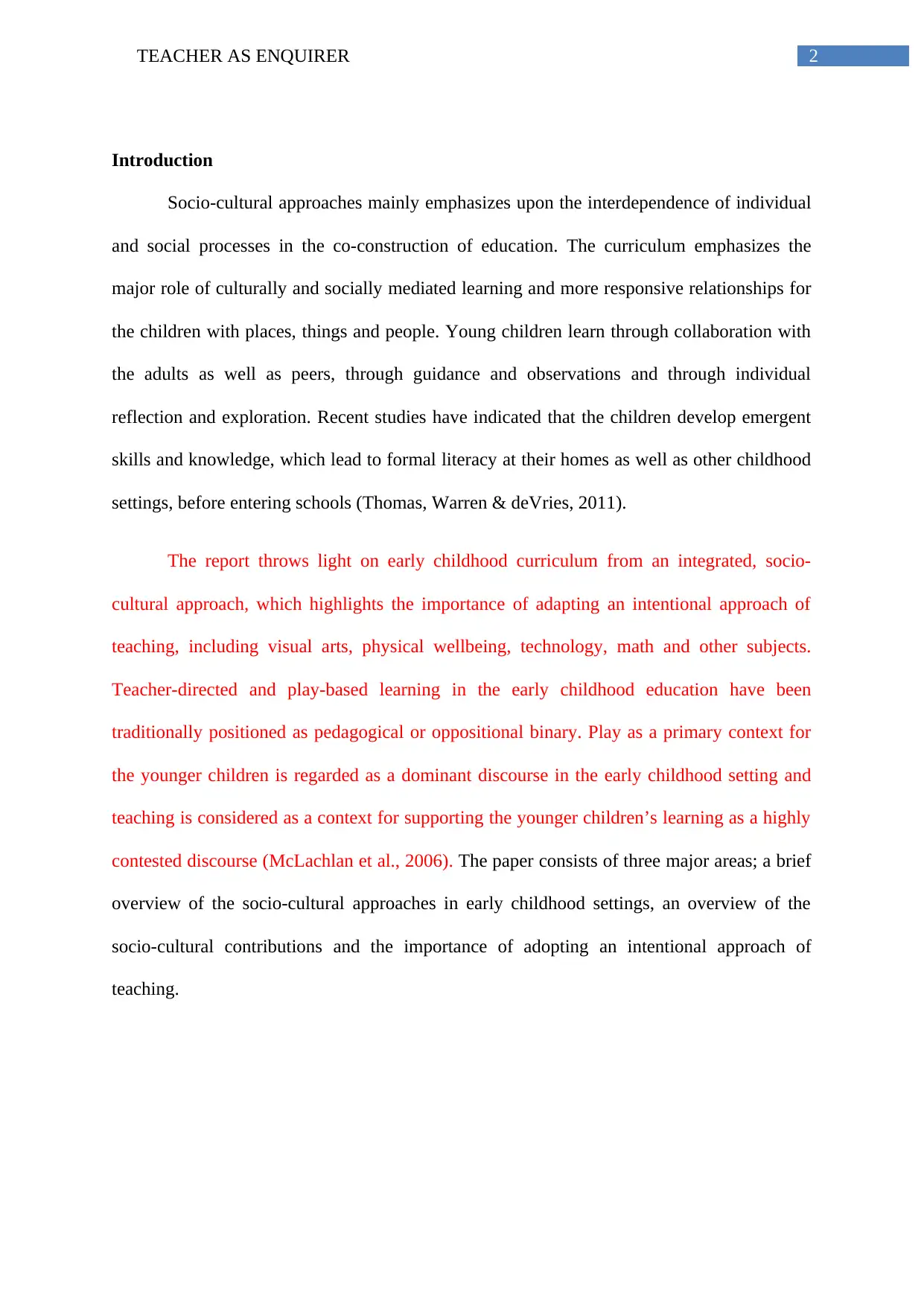
2TEACHER AS ENQUIRER
Introduction
Socio-cultural approaches mainly emphasizes upon the interdependence of individual
and social processes in the co-construction of education. The curriculum emphasizes the
major role of culturally and socially mediated learning and more responsive relationships for
the children with places, things and people. Young children learn through collaboration with
the adults as well as peers, through guidance and observations and through individual
reflection and exploration. Recent studies have indicated that the children develop emergent
skills and knowledge, which lead to formal literacy at their homes as well as other childhood
settings, before entering schools (Thomas, Warren & deVries, 2011).
The report throws light on early childhood curriculum from an integrated, socio-
cultural approach, which highlights the importance of adapting an intentional approach of
teaching, including visual arts, physical wellbeing, technology, math and other subjects.
Teacher-directed and play-based learning in the early childhood education have been
traditionally positioned as pedagogical or oppositional binary. Play as a primary context for
the younger children is regarded as a dominant discourse in the early childhood setting and
teaching is considered as a context for supporting the younger children’s learning as a highly
contested discourse (McLachlan et al., 2006). The paper consists of three major areas; a brief
overview of the socio-cultural approaches in early childhood settings, an overview of the
socio-cultural contributions and the importance of adopting an intentional approach of
teaching.
Introduction
Socio-cultural approaches mainly emphasizes upon the interdependence of individual
and social processes in the co-construction of education. The curriculum emphasizes the
major role of culturally and socially mediated learning and more responsive relationships for
the children with places, things and people. Young children learn through collaboration with
the adults as well as peers, through guidance and observations and through individual
reflection and exploration. Recent studies have indicated that the children develop emergent
skills and knowledge, which lead to formal literacy at their homes as well as other childhood
settings, before entering schools (Thomas, Warren & deVries, 2011).
The report throws light on early childhood curriculum from an integrated, socio-
cultural approach, which highlights the importance of adapting an intentional approach of
teaching, including visual arts, physical wellbeing, technology, math and other subjects.
Teacher-directed and play-based learning in the early childhood education have been
traditionally positioned as pedagogical or oppositional binary. Play as a primary context for
the younger children is regarded as a dominant discourse in the early childhood setting and
teaching is considered as a context for supporting the younger children’s learning as a highly
contested discourse (McLachlan et al., 2006). The paper consists of three major areas; a brief
overview of the socio-cultural approaches in early childhood settings, an overview of the
socio-cultural contributions and the importance of adopting an intentional approach of
teaching.
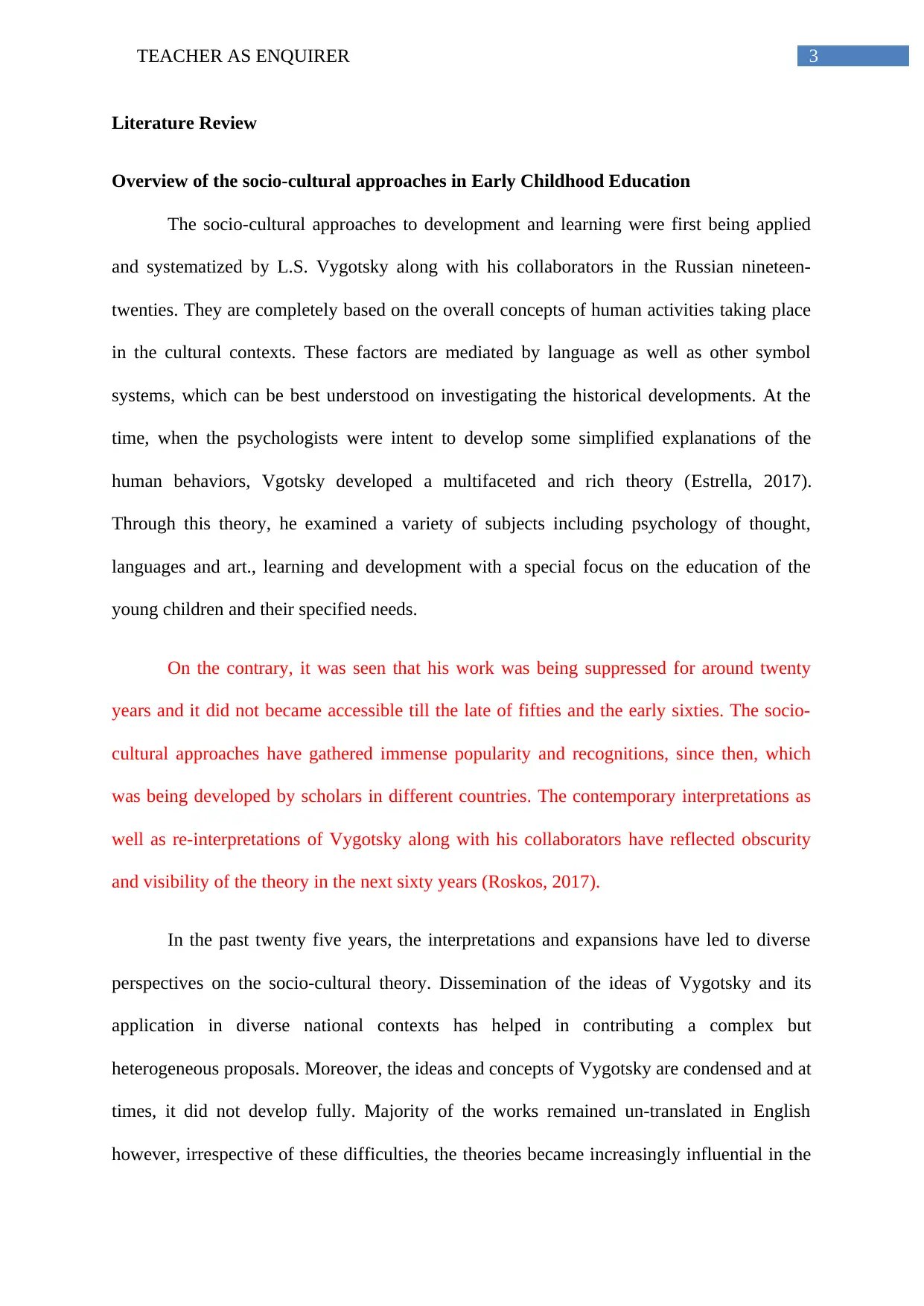
3TEACHER AS ENQUIRER
Literature Review
Overview of the socio-cultural approaches in Early Childhood Education
The socio-cultural approaches to development and learning were first being applied
and systematized by L.S. Vygotsky along with his collaborators in the Russian nineteen-
twenties. They are completely based on the overall concepts of human activities taking place
in the cultural contexts. These factors are mediated by language as well as other symbol
systems, which can be best understood on investigating the historical developments. At the
time, when the psychologists were intent to develop some simplified explanations of the
human behaviors, Vgotsky developed a multifaceted and rich theory (Estrella, 2017).
Through this theory, he examined a variety of subjects including psychology of thought,
languages and art., learning and development with a special focus on the education of the
young children and their specified needs.
On the contrary, it was seen that his work was being suppressed for around twenty
years and it did not became accessible till the late of fifties and the early sixties. The socio-
cultural approaches have gathered immense popularity and recognitions, since then, which
was being developed by scholars in different countries. The contemporary interpretations as
well as re-interpretations of Vygotsky along with his collaborators have reflected obscurity
and visibility of the theory in the next sixty years (Roskos, 2017).
In the past twenty five years, the interpretations and expansions have led to diverse
perspectives on the socio-cultural theory. Dissemination of the ideas of Vygotsky and its
application in diverse national contexts has helped in contributing a complex but
heterogeneous proposals. Moreover, the ideas and concepts of Vygotsky are condensed and at
times, it did not develop fully. Majority of the works remained un-translated in English
however, irrespective of these difficulties, the theories became increasingly influential in the
Literature Review
Overview of the socio-cultural approaches in Early Childhood Education
The socio-cultural approaches to development and learning were first being applied
and systematized by L.S. Vygotsky along with his collaborators in the Russian nineteen-
twenties. They are completely based on the overall concepts of human activities taking place
in the cultural contexts. These factors are mediated by language as well as other symbol
systems, which can be best understood on investigating the historical developments. At the
time, when the psychologists were intent to develop some simplified explanations of the
human behaviors, Vgotsky developed a multifaceted and rich theory (Estrella, 2017).
Through this theory, he examined a variety of subjects including psychology of thought,
languages and art., learning and development with a special focus on the education of the
young children and their specified needs.
On the contrary, it was seen that his work was being suppressed for around twenty
years and it did not became accessible till the late of fifties and the early sixties. The socio-
cultural approaches have gathered immense popularity and recognitions, since then, which
was being developed by scholars in different countries. The contemporary interpretations as
well as re-interpretations of Vygotsky along with his collaborators have reflected obscurity
and visibility of the theory in the next sixty years (Roskos, 2017).
In the past twenty five years, the interpretations and expansions have led to diverse
perspectives on the socio-cultural theory. Dissemination of the ideas of Vygotsky and its
application in diverse national contexts has helped in contributing a complex but
heterogeneous proposals. Moreover, the ideas and concepts of Vygotsky are condensed and at
times, it did not develop fully. Majority of the works remained un-translated in English
however, irrespective of these difficulties, the theories became increasingly influential in the
Secure Best Marks with AI Grader
Need help grading? Try our AI Grader for instant feedback on your assignments.
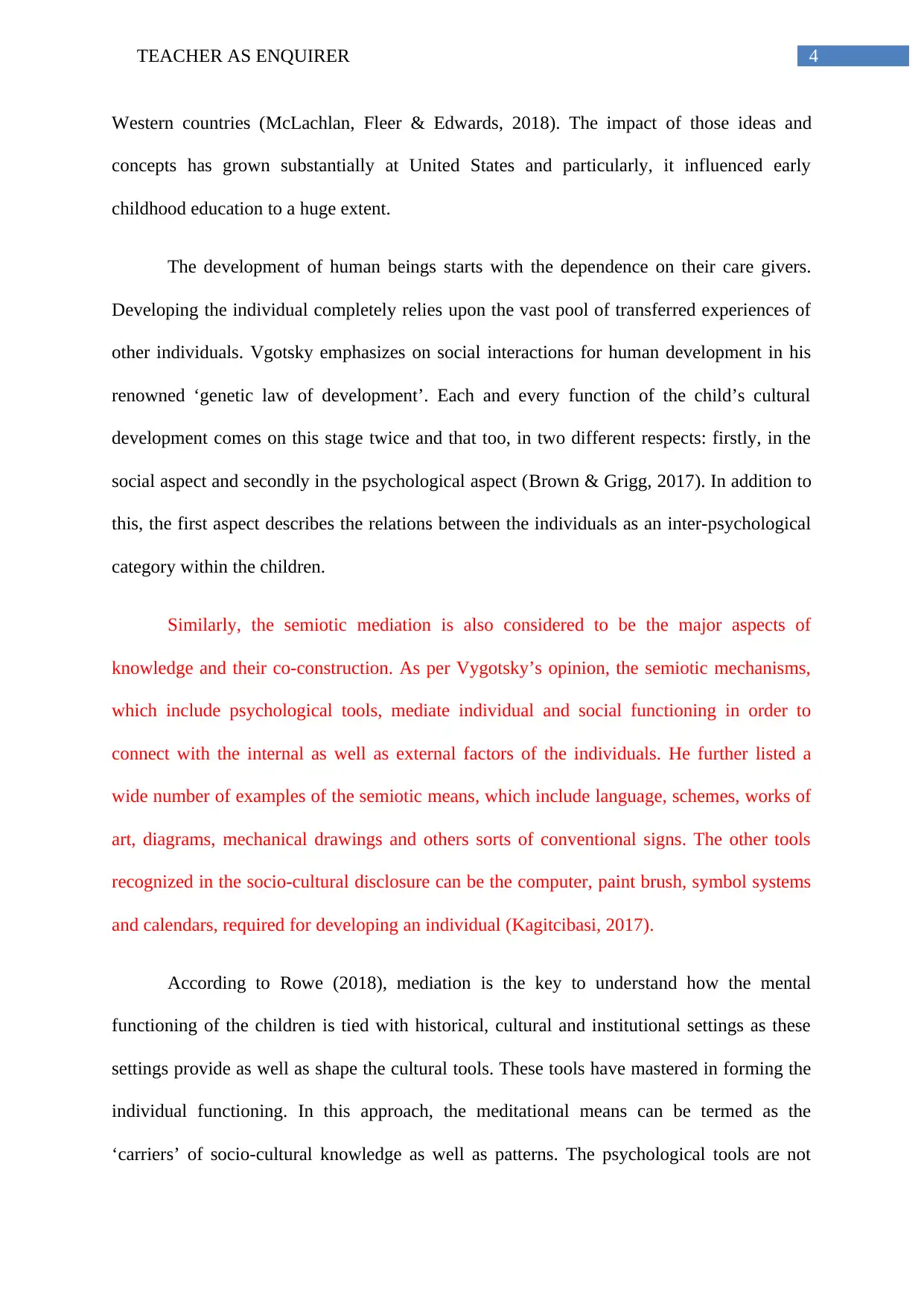
4TEACHER AS ENQUIRER
Western countries (McLachlan, Fleer & Edwards, 2018). The impact of those ideas and
concepts has grown substantially at United States and particularly, it influenced early
childhood education to a huge extent.
The development of human beings starts with the dependence on their care givers.
Developing the individual completely relies upon the vast pool of transferred experiences of
other individuals. Vgotsky emphasizes on social interactions for human development in his
renowned ‘genetic law of development’. Each and every function of the child’s cultural
development comes on this stage twice and that too, in two different respects: firstly, in the
social aspect and secondly in the psychological aspect (Brown & Grigg, 2017). In addition to
this, the first aspect describes the relations between the individuals as an inter-psychological
category within the children.
Similarly, the semiotic mediation is also considered to be the major aspects of
knowledge and their co-construction. As per Vygotsky’s opinion, the semiotic mechanisms,
which include psychological tools, mediate individual and social functioning in order to
connect with the internal as well as external factors of the individuals. He further listed a
wide number of examples of the semiotic means, which include language, schemes, works of
art, diagrams, mechanical drawings and others sorts of conventional signs. The other tools
recognized in the socio-cultural disclosure can be the computer, paint brush, symbol systems
and calendars, required for developing an individual (Kagitcibasi, 2017).
According to Rowe (2018), mediation is the key to understand how the mental
functioning of the children is tied with historical, cultural and institutional settings as these
settings provide as well as shape the cultural tools. These tools have mastered in forming the
individual functioning. In this approach, the meditational means can be termed as the
‘carriers’ of socio-cultural knowledge as well as patterns. The psychological tools are not
Western countries (McLachlan, Fleer & Edwards, 2018). The impact of those ideas and
concepts has grown substantially at United States and particularly, it influenced early
childhood education to a huge extent.
The development of human beings starts with the dependence on their care givers.
Developing the individual completely relies upon the vast pool of transferred experiences of
other individuals. Vgotsky emphasizes on social interactions for human development in his
renowned ‘genetic law of development’. Each and every function of the child’s cultural
development comes on this stage twice and that too, in two different respects: firstly, in the
social aspect and secondly in the psychological aspect (Brown & Grigg, 2017). In addition to
this, the first aspect describes the relations between the individuals as an inter-psychological
category within the children.
Similarly, the semiotic mediation is also considered to be the major aspects of
knowledge and their co-construction. As per Vygotsky’s opinion, the semiotic mechanisms,
which include psychological tools, mediate individual and social functioning in order to
connect with the internal as well as external factors of the individuals. He further listed a
wide number of examples of the semiotic means, which include language, schemes, works of
art, diagrams, mechanical drawings and others sorts of conventional signs. The other tools
recognized in the socio-cultural disclosure can be the computer, paint brush, symbol systems
and calendars, required for developing an individual (Kagitcibasi, 2017).
According to Rowe (2018), mediation is the key to understand how the mental
functioning of the children is tied with historical, cultural and institutional settings as these
settings provide as well as shape the cultural tools. These tools have mastered in forming the
individual functioning. In this approach, the meditational means can be termed as the
‘carriers’ of socio-cultural knowledge as well as patterns. The psychological tools are not
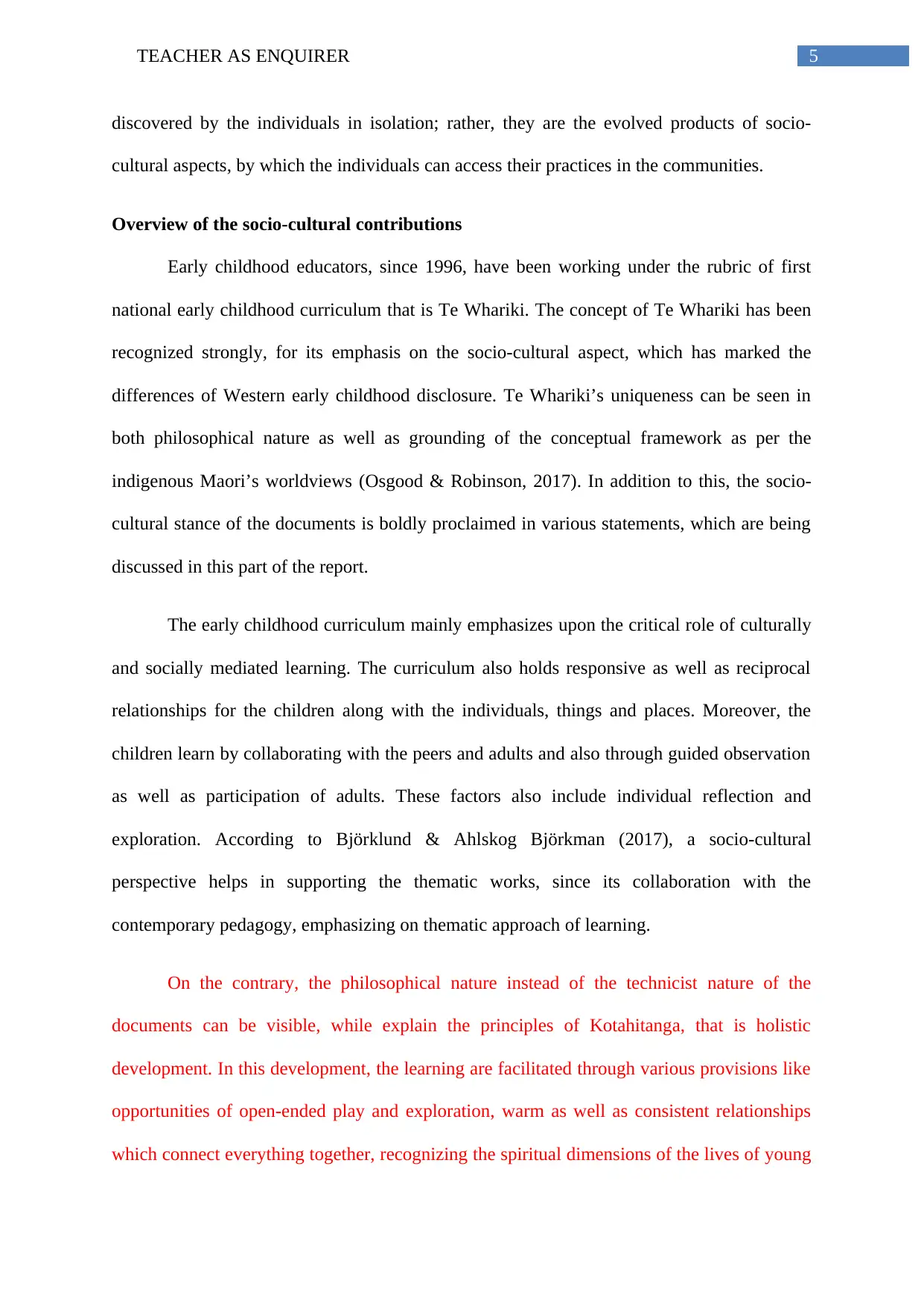
5TEACHER AS ENQUIRER
discovered by the individuals in isolation; rather, they are the evolved products of socio-
cultural aspects, by which the individuals can access their practices in the communities.
Overview of the socio-cultural contributions
Early childhood educators, since 1996, have been working under the rubric of first
national early childhood curriculum that is Te Whariki. The concept of Te Whariki has been
recognized strongly, for its emphasis on the socio-cultural aspect, which has marked the
differences of Western early childhood disclosure. Te Whariki’s uniqueness can be seen in
both philosophical nature as well as grounding of the conceptual framework as per the
indigenous Maori’s worldviews (Osgood & Robinson, 2017). In addition to this, the socio-
cultural stance of the documents is boldly proclaimed in various statements, which are being
discussed in this part of the report.
The early childhood curriculum mainly emphasizes upon the critical role of culturally
and socially mediated learning. The curriculum also holds responsive as well as reciprocal
relationships for the children along with the individuals, things and places. Moreover, the
children learn by collaborating with the peers and adults and also through guided observation
as well as participation of adults. These factors also include individual reflection and
exploration. According to Björklund & Ahlskog Björkman (2017), a socio-cultural
perspective helps in supporting the thematic works, since its collaboration with the
contemporary pedagogy, emphasizing on thematic approach of learning.
On the contrary, the philosophical nature instead of the technicist nature of the
documents can be visible, while explain the principles of Kotahitanga, that is holistic
development. In this development, the learning are facilitated through various provisions like
opportunities of open-ended play and exploration, warm as well as consistent relationships
which connect everything together, recognizing the spiritual dimensions of the lives of young
discovered by the individuals in isolation; rather, they are the evolved products of socio-
cultural aspects, by which the individuals can access their practices in the communities.
Overview of the socio-cultural contributions
Early childhood educators, since 1996, have been working under the rubric of first
national early childhood curriculum that is Te Whariki. The concept of Te Whariki has been
recognized strongly, for its emphasis on the socio-cultural aspect, which has marked the
differences of Western early childhood disclosure. Te Whariki’s uniqueness can be seen in
both philosophical nature as well as grounding of the conceptual framework as per the
indigenous Maori’s worldviews (Osgood & Robinson, 2017). In addition to this, the socio-
cultural stance of the documents is boldly proclaimed in various statements, which are being
discussed in this part of the report.
The early childhood curriculum mainly emphasizes upon the critical role of culturally
and socially mediated learning. The curriculum also holds responsive as well as reciprocal
relationships for the children along with the individuals, things and places. Moreover, the
children learn by collaborating with the peers and adults and also through guided observation
as well as participation of adults. These factors also include individual reflection and
exploration. According to Björklund & Ahlskog Björkman (2017), a socio-cultural
perspective helps in supporting the thematic works, since its collaboration with the
contemporary pedagogy, emphasizing on thematic approach of learning.
On the contrary, the philosophical nature instead of the technicist nature of the
documents can be visible, while explain the principles of Kotahitanga, that is holistic
development. In this development, the learning are facilitated through various provisions like
opportunities of open-ended play and exploration, warm as well as consistent relationships
which connect everything together, recognizing the spiritual dimensions of the lives of young
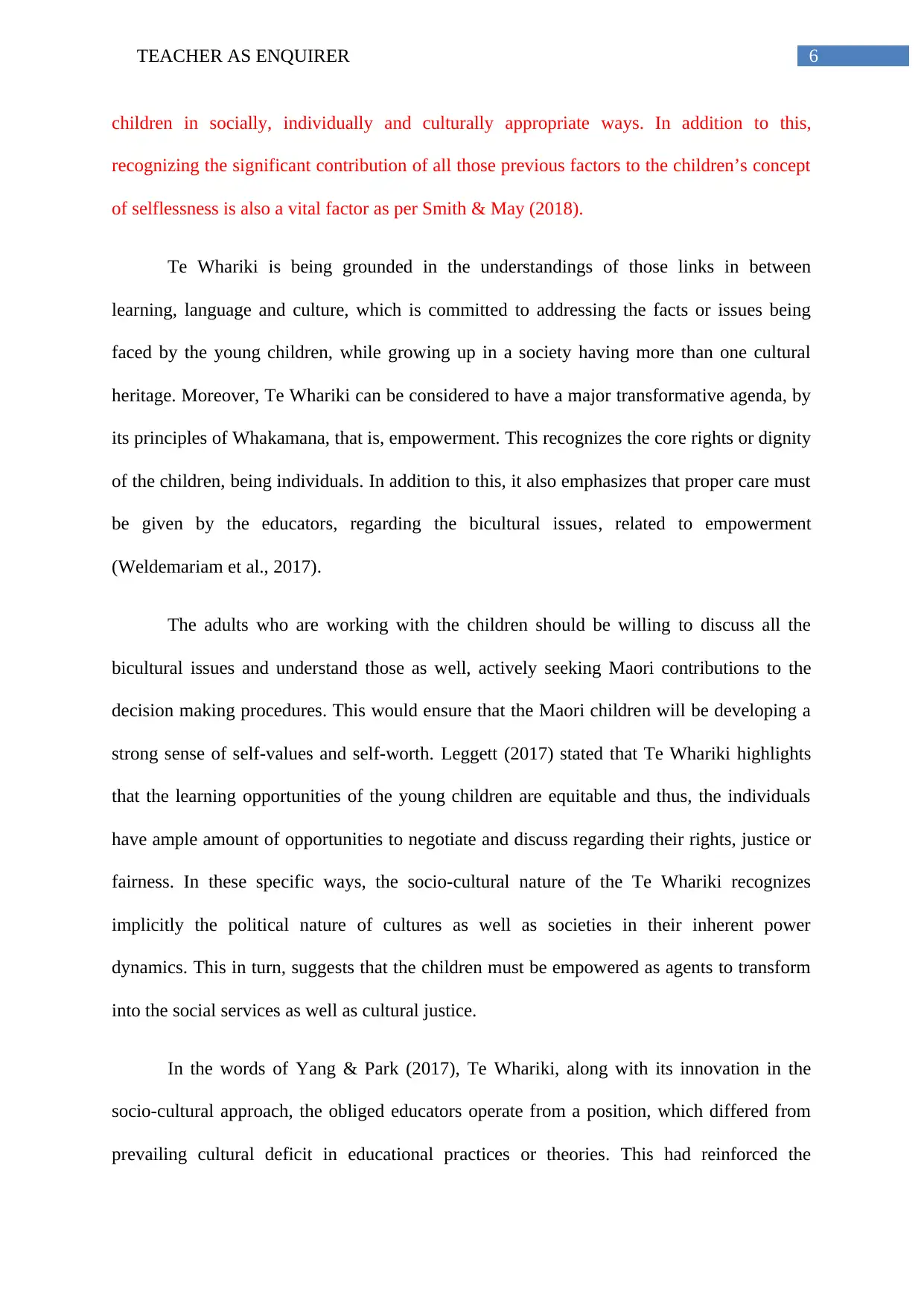
6TEACHER AS ENQUIRER
children in socially, individually and culturally appropriate ways. In addition to this,
recognizing the significant contribution of all those previous factors to the children’s concept
of selflessness is also a vital factor as per Smith & May (2018).
Te Whariki is being grounded in the understandings of those links in between
learning, language and culture, which is committed to addressing the facts or issues being
faced by the young children, while growing up in a society having more than one cultural
heritage. Moreover, Te Whariki can be considered to have a major transformative agenda, by
its principles of Whakamana, that is, empowerment. This recognizes the core rights or dignity
of the children, being individuals. In addition to this, it also emphasizes that proper care must
be given by the educators, regarding the bicultural issues, related to empowerment
(Weldemariam et al., 2017).
The adults who are working with the children should be willing to discuss all the
bicultural issues and understand those as well, actively seeking Maori contributions to the
decision making procedures. This would ensure that the Maori children will be developing a
strong sense of self-values and self-worth. Leggett (2017) stated that Te Whariki highlights
that the learning opportunities of the young children are equitable and thus, the individuals
have ample amount of opportunities to negotiate and discuss regarding their rights, justice or
fairness. In these specific ways, the socio-cultural nature of the Te Whariki recognizes
implicitly the political nature of cultures as well as societies in their inherent power
dynamics. This in turn, suggests that the children must be empowered as agents to transform
into the social services as well as cultural justice.
In the words of Yang & Park (2017), Te Whariki, along with its innovation in the
socio-cultural approach, the obliged educators operate from a position, which differed from
prevailing cultural deficit in educational practices or theories. This had reinforced the
children in socially, individually and culturally appropriate ways. In addition to this,
recognizing the significant contribution of all those previous factors to the children’s concept
of selflessness is also a vital factor as per Smith & May (2018).
Te Whariki is being grounded in the understandings of those links in between
learning, language and culture, which is committed to addressing the facts or issues being
faced by the young children, while growing up in a society having more than one cultural
heritage. Moreover, Te Whariki can be considered to have a major transformative agenda, by
its principles of Whakamana, that is, empowerment. This recognizes the core rights or dignity
of the children, being individuals. In addition to this, it also emphasizes that proper care must
be given by the educators, regarding the bicultural issues, related to empowerment
(Weldemariam et al., 2017).
The adults who are working with the children should be willing to discuss all the
bicultural issues and understand those as well, actively seeking Maori contributions to the
decision making procedures. This would ensure that the Maori children will be developing a
strong sense of self-values and self-worth. Leggett (2017) stated that Te Whariki highlights
that the learning opportunities of the young children are equitable and thus, the individuals
have ample amount of opportunities to negotiate and discuss regarding their rights, justice or
fairness. In these specific ways, the socio-cultural nature of the Te Whariki recognizes
implicitly the political nature of cultures as well as societies in their inherent power
dynamics. This in turn, suggests that the children must be empowered as agents to transform
into the social services as well as cultural justice.
In the words of Yang & Park (2017), Te Whariki, along with its innovation in the
socio-cultural approach, the obliged educators operate from a position, which differed from
prevailing cultural deficit in educational practices or theories. This had reinforced the
Paraphrase This Document
Need a fresh take? Get an instant paraphrase of this document with our AI Paraphraser
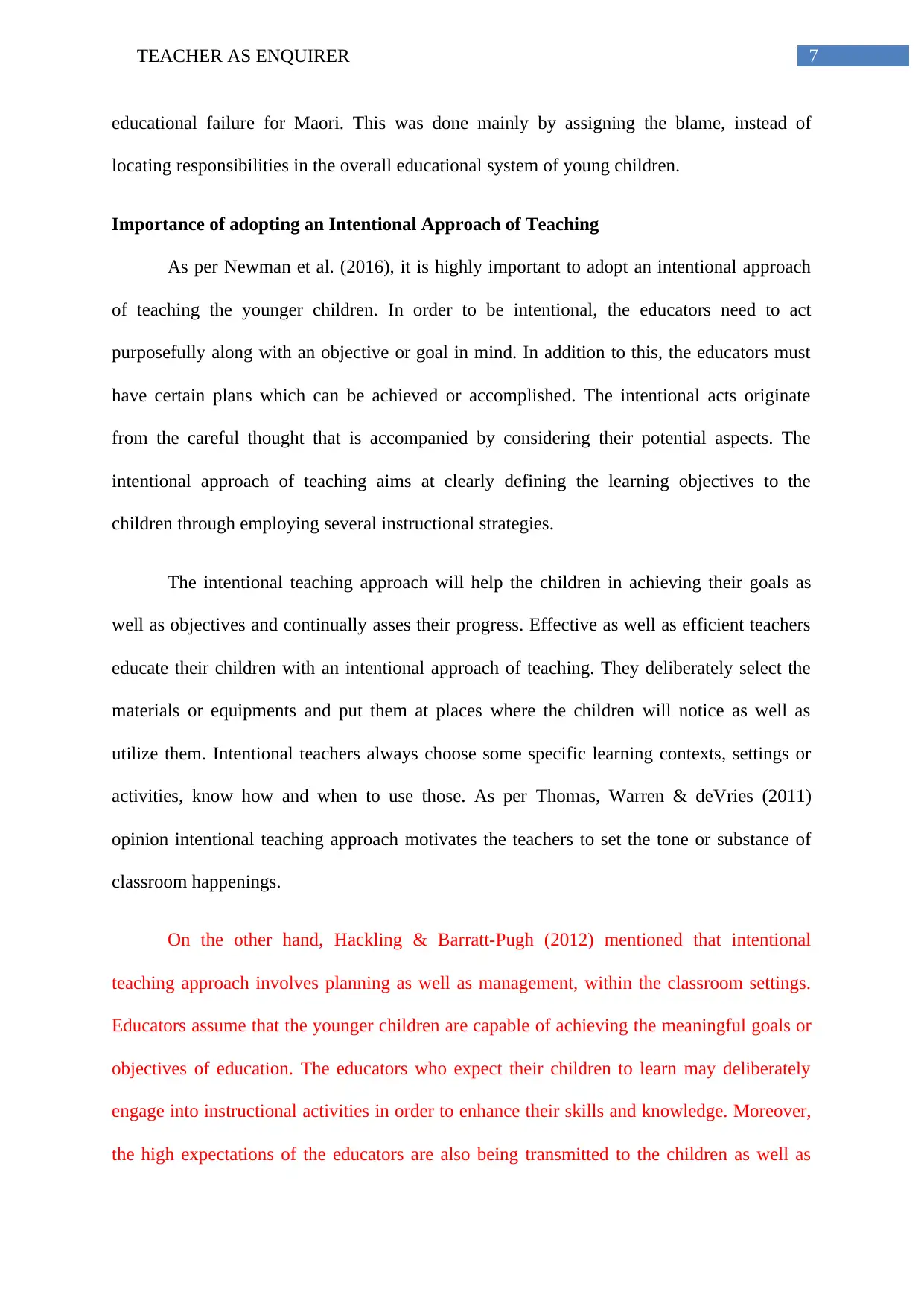
7TEACHER AS ENQUIRER
educational failure for Maori. This was done mainly by assigning the blame, instead of
locating responsibilities in the overall educational system of young children.
Importance of adopting an Intentional Approach of Teaching
As per Newman et al. (2016), it is highly important to adopt an intentional approach
of teaching the younger children. In order to be intentional, the educators need to act
purposefully along with an objective or goal in mind. In addition to this, the educators must
have certain plans which can be achieved or accomplished. The intentional acts originate
from the careful thought that is accompanied by considering their potential aspects. The
intentional approach of teaching aims at clearly defining the learning objectives to the
children through employing several instructional strategies.
The intentional teaching approach will help the children in achieving their goals as
well as objectives and continually asses their progress. Effective as well as efficient teachers
educate their children with an intentional approach of teaching. They deliberately select the
materials or equipments and put them at places where the children will notice as well as
utilize them. Intentional teachers always choose some specific learning contexts, settings or
activities, know how and when to use those. As per Thomas, Warren & deVries (2011)
opinion intentional teaching approach motivates the teachers to set the tone or substance of
classroom happenings.
On the other hand, Hackling & Barratt-Pugh (2012) mentioned that intentional
teaching approach involves planning as well as management, within the classroom settings.
Educators assume that the younger children are capable of achieving the meaningful goals or
objectives of education. The educators who expect their children to learn may deliberately
engage into instructional activities in order to enhance their skills and knowledge. Moreover,
the high expectations of the educators are also being transmitted to the children as well as
educational failure for Maori. This was done mainly by assigning the blame, instead of
locating responsibilities in the overall educational system of young children.
Importance of adopting an Intentional Approach of Teaching
As per Newman et al. (2016), it is highly important to adopt an intentional approach
of teaching the younger children. In order to be intentional, the educators need to act
purposefully along with an objective or goal in mind. In addition to this, the educators must
have certain plans which can be achieved or accomplished. The intentional acts originate
from the careful thought that is accompanied by considering their potential aspects. The
intentional approach of teaching aims at clearly defining the learning objectives to the
children through employing several instructional strategies.
The intentional teaching approach will help the children in achieving their goals as
well as objectives and continually asses their progress. Effective as well as efficient teachers
educate their children with an intentional approach of teaching. They deliberately select the
materials or equipments and put them at places where the children will notice as well as
utilize them. Intentional teachers always choose some specific learning contexts, settings or
activities, know how and when to use those. As per Thomas, Warren & deVries (2011)
opinion intentional teaching approach motivates the teachers to set the tone or substance of
classroom happenings.
On the other hand, Hackling & Barratt-Pugh (2012) mentioned that intentional
teaching approach involves planning as well as management, within the classroom settings.
Educators assume that the younger children are capable of achieving the meaningful goals or
objectives of education. The educators who expect their children to learn may deliberately
engage into instructional activities in order to enhance their skills and knowledge. Moreover,
the high expectations of the educators are also being transmitted to the children as well as
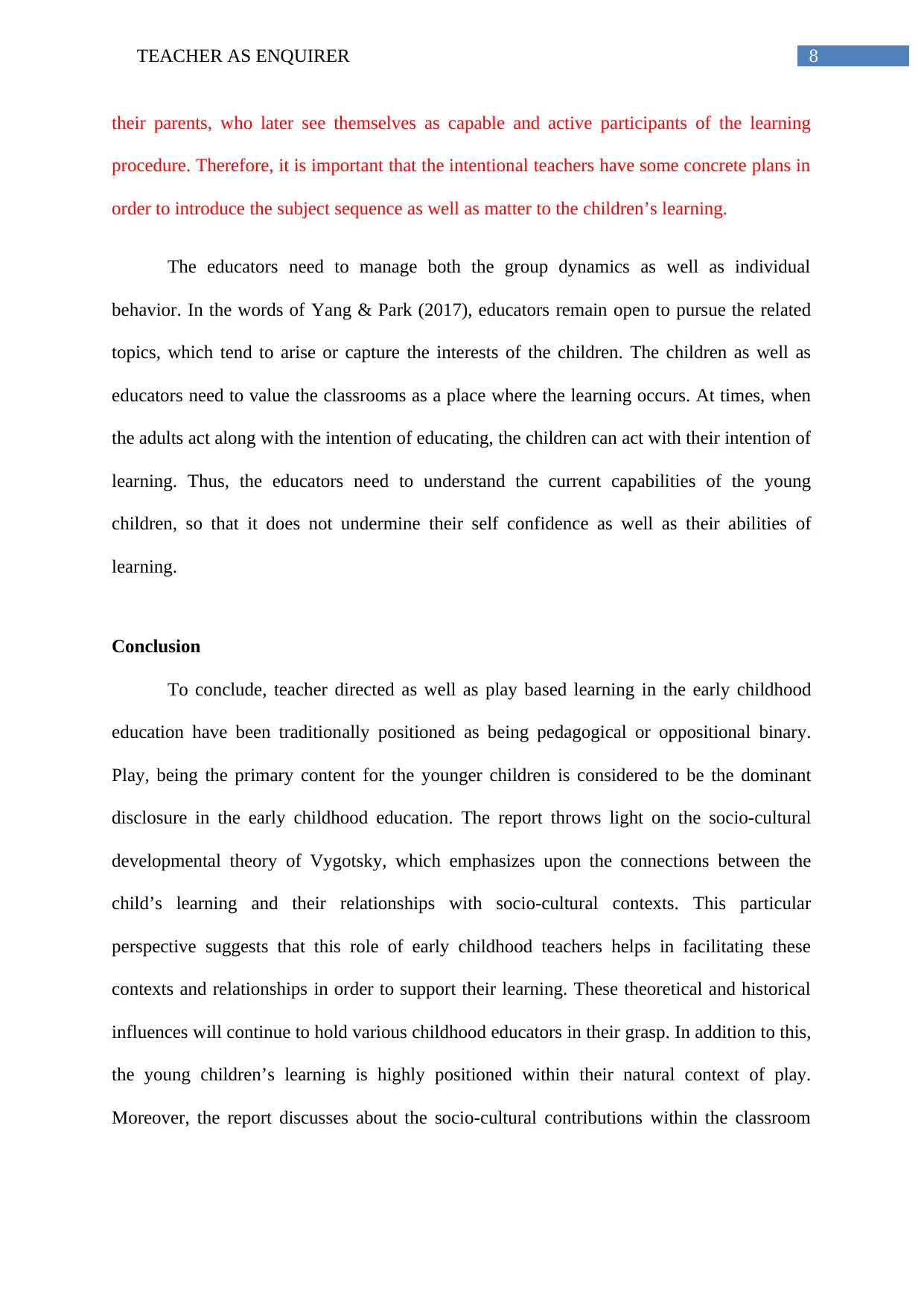
8TEACHER AS ENQUIRER
their parents, who later see themselves as capable and active participants of the learning
procedure. Therefore, it is important that the intentional teachers have some concrete plans in
order to introduce the subject sequence as well as matter to the children’s learning.
The educators need to manage both the group dynamics as well as individual
behavior. In the words of Yang & Park (2017), educators remain open to pursue the related
topics, which tend to arise or capture the interests of the children. The children as well as
educators need to value the classrooms as a place where the learning occurs. At times, when
the adults act along with the intention of educating, the children can act with their intention of
learning. Thus, the educators need to understand the current capabilities of the young
children, so that it does not undermine their self confidence as well as their abilities of
learning.
Conclusion
To conclude, teacher directed as well as play based learning in the early childhood
education have been traditionally positioned as being pedagogical or oppositional binary.
Play, being the primary content for the younger children is considered to be the dominant
disclosure in the early childhood education. The report throws light on the socio-cultural
developmental theory of Vygotsky, which emphasizes upon the connections between the
child’s learning and their relationships with socio-cultural contexts. This particular
perspective suggests that this role of early childhood teachers helps in facilitating these
contexts and relationships in order to support their learning. These theoretical and historical
influences will continue to hold various childhood educators in their grasp. In addition to this,
the young children’s learning is highly positioned within their natural context of play.
Moreover, the report discusses about the socio-cultural contributions within the classroom
their parents, who later see themselves as capable and active participants of the learning
procedure. Therefore, it is important that the intentional teachers have some concrete plans in
order to introduce the subject sequence as well as matter to the children’s learning.
The educators need to manage both the group dynamics as well as individual
behavior. In the words of Yang & Park (2017), educators remain open to pursue the related
topics, which tend to arise or capture the interests of the children. The children as well as
educators need to value the classrooms as a place where the learning occurs. At times, when
the adults act along with the intention of educating, the children can act with their intention of
learning. Thus, the educators need to understand the current capabilities of the young
children, so that it does not undermine their self confidence as well as their abilities of
learning.
Conclusion
To conclude, teacher directed as well as play based learning in the early childhood
education have been traditionally positioned as being pedagogical or oppositional binary.
Play, being the primary content for the younger children is considered to be the dominant
disclosure in the early childhood education. The report throws light on the socio-cultural
developmental theory of Vygotsky, which emphasizes upon the connections between the
child’s learning and their relationships with socio-cultural contexts. This particular
perspective suggests that this role of early childhood teachers helps in facilitating these
contexts and relationships in order to support their learning. These theoretical and historical
influences will continue to hold various childhood educators in their grasp. In addition to this,
the young children’s learning is highly positioned within their natural context of play.
Moreover, the report discusses about the socio-cultural contributions within the classroom
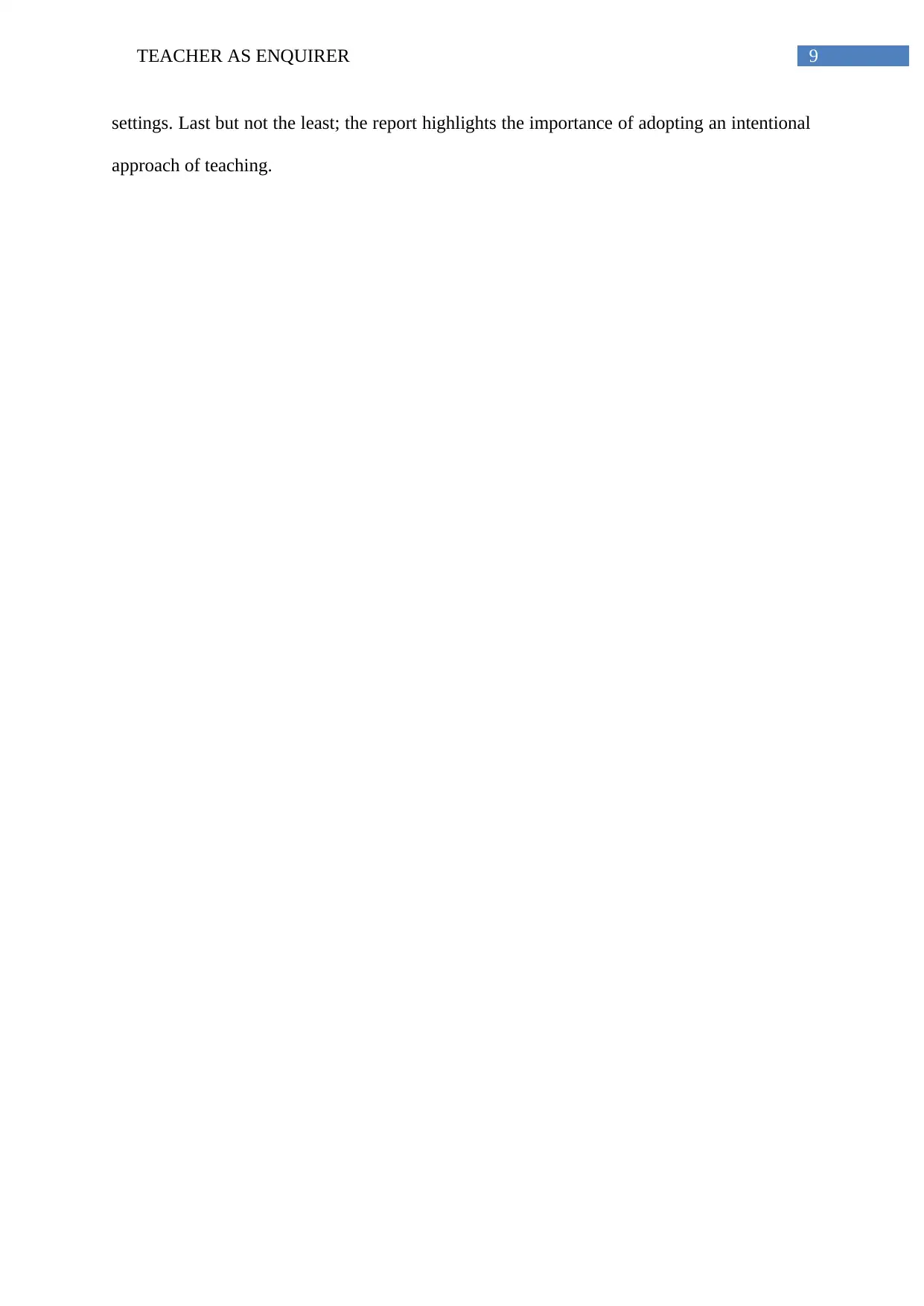
9TEACHER AS ENQUIRER
settings. Last but not the least; the report highlights the importance of adopting an intentional
approach of teaching.
settings. Last but not the least; the report highlights the importance of adopting an intentional
approach of teaching.
Secure Best Marks with AI Grader
Need help grading? Try our AI Grader for instant feedback on your assignments.
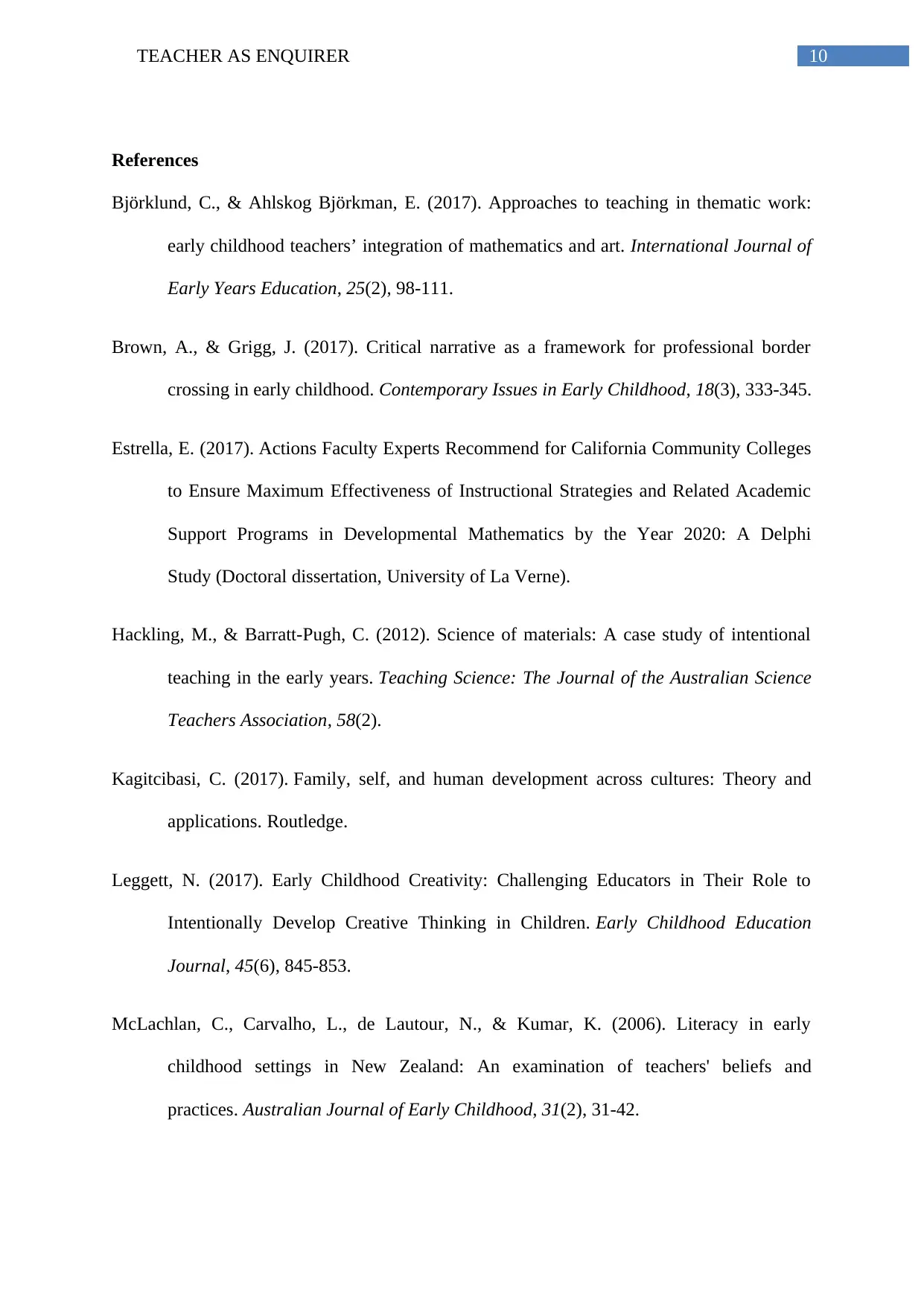
10TEACHER AS ENQUIRER
References
Björklund, C., & Ahlskog Björkman, E. (2017). Approaches to teaching in thematic work:
early childhood teachers’ integration of mathematics and art. International Journal of
Early Years Education, 25(2), 98-111.
Brown, A., & Grigg, J. (2017). Critical narrative as a framework for professional border
crossing in early childhood. Contemporary Issues in Early Childhood, 18(3), 333-345.
Estrella, E. (2017). Actions Faculty Experts Recommend for California Community Colleges
to Ensure Maximum Effectiveness of Instructional Strategies and Related Academic
Support Programs in Developmental Mathematics by the Year 2020: A Delphi
Study (Doctoral dissertation, University of La Verne).
Hackling, M., & Barratt-Pugh, C. (2012). Science of materials: A case study of intentional
teaching in the early years. Teaching Science: The Journal of the Australian Science
Teachers Association, 58(2).
Kagitcibasi, C. (2017). Family, self, and human development across cultures: Theory and
applications. Routledge.
Leggett, N. (2017). Early Childhood Creativity: Challenging Educators in Their Role to
Intentionally Develop Creative Thinking in Children. Early Childhood Education
Journal, 45(6), 845-853.
McLachlan, C., Carvalho, L., de Lautour, N., & Kumar, K. (2006). Literacy in early
childhood settings in New Zealand: An examination of teachers' beliefs and
practices. Australian Journal of Early Childhood, 31(2), 31-42.
References
Björklund, C., & Ahlskog Björkman, E. (2017). Approaches to teaching in thematic work:
early childhood teachers’ integration of mathematics and art. International Journal of
Early Years Education, 25(2), 98-111.
Brown, A., & Grigg, J. (2017). Critical narrative as a framework for professional border
crossing in early childhood. Contemporary Issues in Early Childhood, 18(3), 333-345.
Estrella, E. (2017). Actions Faculty Experts Recommend for California Community Colleges
to Ensure Maximum Effectiveness of Instructional Strategies and Related Academic
Support Programs in Developmental Mathematics by the Year 2020: A Delphi
Study (Doctoral dissertation, University of La Verne).
Hackling, M., & Barratt-Pugh, C. (2012). Science of materials: A case study of intentional
teaching in the early years. Teaching Science: The Journal of the Australian Science
Teachers Association, 58(2).
Kagitcibasi, C. (2017). Family, self, and human development across cultures: Theory and
applications. Routledge.
Leggett, N. (2017). Early Childhood Creativity: Challenging Educators in Their Role to
Intentionally Develop Creative Thinking in Children. Early Childhood Education
Journal, 45(6), 845-853.
McLachlan, C., Carvalho, L., de Lautour, N., & Kumar, K. (2006). Literacy in early
childhood settings in New Zealand: An examination of teachers' beliefs and
practices. Australian Journal of Early Childhood, 31(2), 31-42.
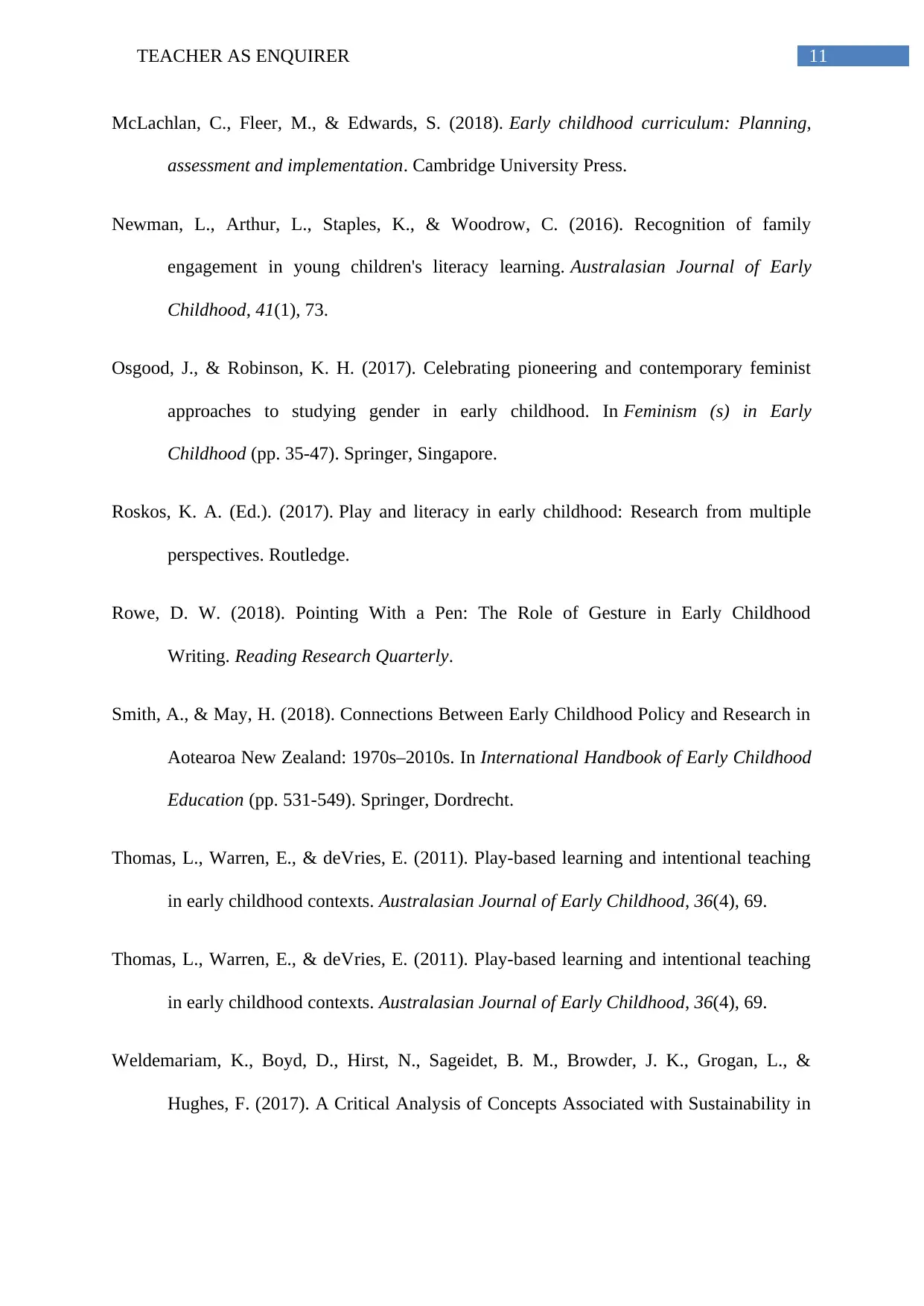
11TEACHER AS ENQUIRER
McLachlan, C., Fleer, M., & Edwards, S. (2018). Early childhood curriculum: Planning,
assessment and implementation. Cambridge University Press.
Newman, L., Arthur, L., Staples, K., & Woodrow, C. (2016). Recognition of family
engagement in young children's literacy learning. Australasian Journal of Early
Childhood, 41(1), 73.
Osgood, J., & Robinson, K. H. (2017). Celebrating pioneering and contemporary feminist
approaches to studying gender in early childhood. In Feminism (s) in Early
Childhood (pp. 35-47). Springer, Singapore.
Roskos, K. A. (Ed.). (2017). Play and literacy in early childhood: Research from multiple
perspectives. Routledge.
Rowe, D. W. (2018). Pointing With a Pen: The Role of Gesture in Early Childhood
Writing. Reading Research Quarterly.
Smith, A., & May, H. (2018). Connections Between Early Childhood Policy and Research in
Aotearoa New Zealand: 1970s–2010s. In International Handbook of Early Childhood
Education (pp. 531-549). Springer, Dordrecht.
Thomas, L., Warren, E., & deVries, E. (2011). Play-based learning and intentional teaching
in early childhood contexts. Australasian Journal of Early Childhood, 36(4), 69.
Thomas, L., Warren, E., & deVries, E. (2011). Play-based learning and intentional teaching
in early childhood contexts. Australasian Journal of Early Childhood, 36(4), 69.
Weldemariam, K., Boyd, D., Hirst, N., Sageidet, B. M., Browder, J. K., Grogan, L., &
Hughes, F. (2017). A Critical Analysis of Concepts Associated with Sustainability in
McLachlan, C., Fleer, M., & Edwards, S. (2018). Early childhood curriculum: Planning,
assessment and implementation. Cambridge University Press.
Newman, L., Arthur, L., Staples, K., & Woodrow, C. (2016). Recognition of family
engagement in young children's literacy learning. Australasian Journal of Early
Childhood, 41(1), 73.
Osgood, J., & Robinson, K. H. (2017). Celebrating pioneering and contemporary feminist
approaches to studying gender in early childhood. In Feminism (s) in Early
Childhood (pp. 35-47). Springer, Singapore.
Roskos, K. A. (Ed.). (2017). Play and literacy in early childhood: Research from multiple
perspectives. Routledge.
Rowe, D. W. (2018). Pointing With a Pen: The Role of Gesture in Early Childhood
Writing. Reading Research Quarterly.
Smith, A., & May, H. (2018). Connections Between Early Childhood Policy and Research in
Aotearoa New Zealand: 1970s–2010s. In International Handbook of Early Childhood
Education (pp. 531-549). Springer, Dordrecht.
Thomas, L., Warren, E., & deVries, E. (2011). Play-based learning and intentional teaching
in early childhood contexts. Australasian Journal of Early Childhood, 36(4), 69.
Thomas, L., Warren, E., & deVries, E. (2011). Play-based learning and intentional teaching
in early childhood contexts. Australasian Journal of Early Childhood, 36(4), 69.
Weldemariam, K., Boyd, D., Hirst, N., Sageidet, B. M., Browder, J. K., Grogan, L., &
Hughes, F. (2017). A Critical Analysis of Concepts Associated with Sustainability in
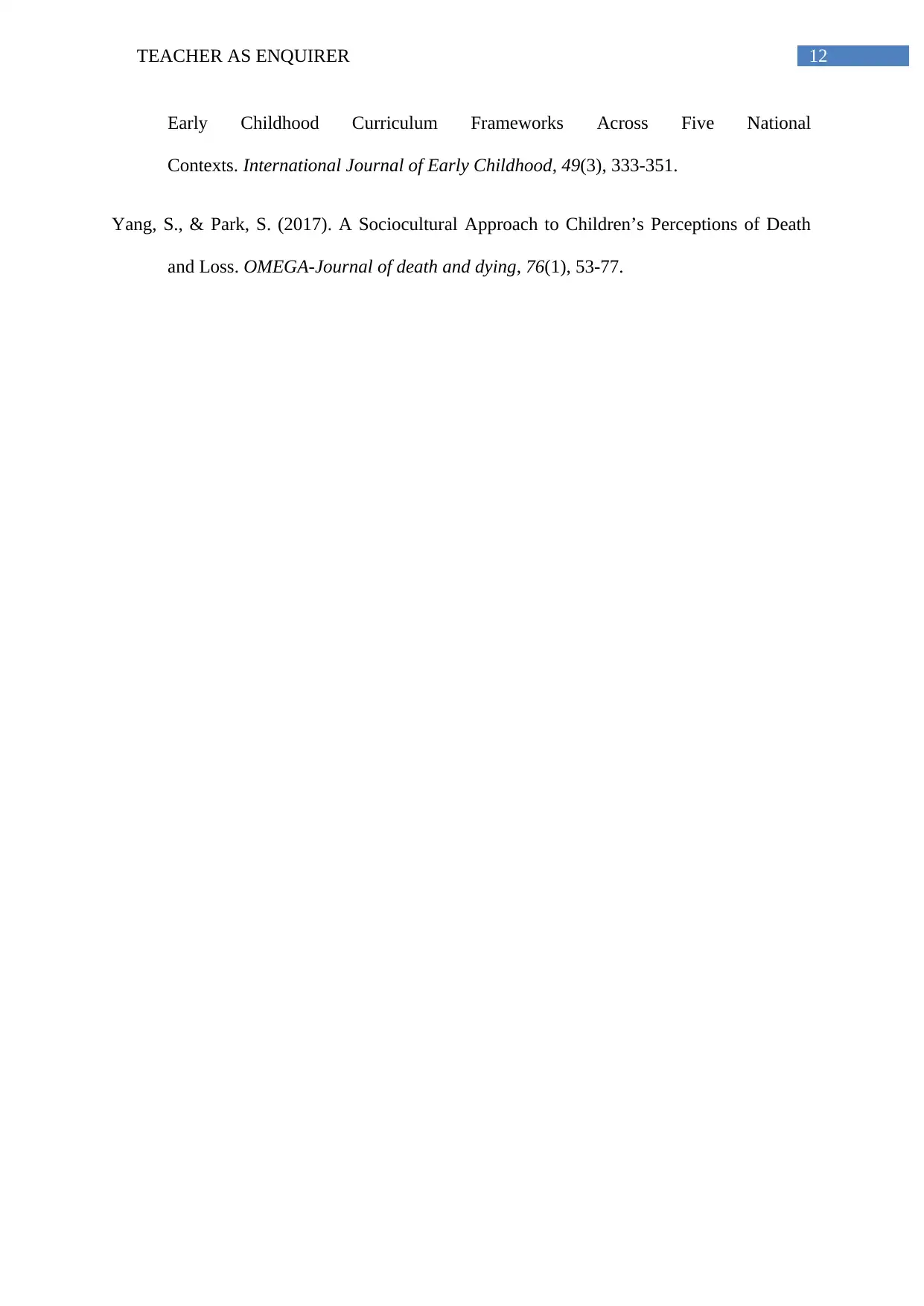
12TEACHER AS ENQUIRER
Early Childhood Curriculum Frameworks Across Five National
Contexts. International Journal of Early Childhood, 49(3), 333-351.
Yang, S., & Park, S. (2017). A Sociocultural Approach to Children’s Perceptions of Death
and Loss. OMEGA-Journal of death and dying, 76(1), 53-77.
Early Childhood Curriculum Frameworks Across Five National
Contexts. International Journal of Early Childhood, 49(3), 333-351.
Yang, S., & Park, S. (2017). A Sociocultural Approach to Children’s Perceptions of Death
and Loss. OMEGA-Journal of death and dying, 76(1), 53-77.
1 out of 13
Related Documents
Your All-in-One AI-Powered Toolkit for Academic Success.
+13062052269
info@desklib.com
Available 24*7 on WhatsApp / Email
![[object Object]](/_next/static/media/star-bottom.7253800d.svg)
Unlock your academic potential
© 2024 | Zucol Services PVT LTD | All rights reserved.





